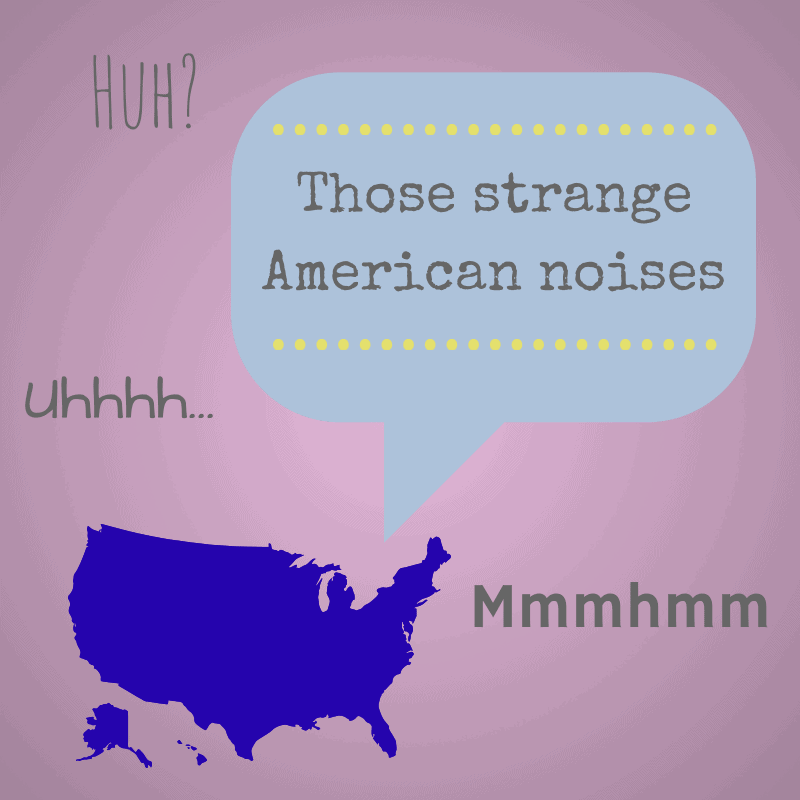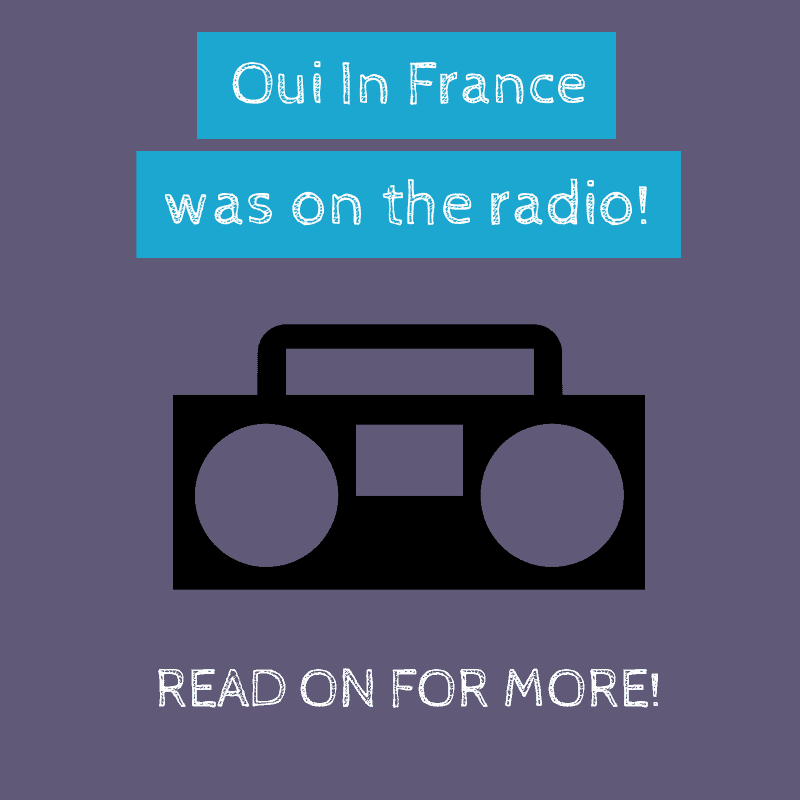France and the French are easy focuses of my blog because, duh, I live here, but after seeing what a hit my post on the strange noises French people make was with native French and non-native French speakers alike, I figured I’d put the spotlight back on my countrymen. Let’s take a look at the strange noises Americans make!
So read on for the not so strange noises Americans make…
The strange noises Americans make
If you’re American, these sounds are familiar to you, but for foreigners who live in the USA or have traveled there, the sounds might have surprised you especially in the beginning. Some of these might hold true for other dialects of English too. Some of the noises are actually words but I assure you they’re 100 percent authentic American. Also, please note this is just a jumping off point and all the sounds and uses for each sound are not mentioned. (Thanks to Tom for helping me with the audio!)
My list of strange noises Americans make:
1. Uh-huh
What it sounds like:
What it means: This is a noise used to confirm that you’re listening to the speaker or that you agree. It’s used commonly on the phone too. It means, “Yes, I hear you.” It can sometimes mean I’m bored and you’re going on and on if the “uh-huhs” are in succession. Can also mean yes in response to a simple question that doesn’t really require much of a response as in the second example.
2. Mmm-hmm
What it sounds like:
What it means: This one is in place of “You’re welcome” and is commonly used for a little favor where an informal “no problem” would also work such as when you hold the door open for someone or someone says thanks after you pass the bread at the dinner table. A “you’re welcome” would work in this situation too but when it’s a very small favor, you’ll hear Americans respond with this noise. This does NOT exist in French and my husband laughs every time he hears it. I had no idea it wasn’t a universal noise until Tom called me out on it with a, “What the heck is THAT??? You think my noises are weird????”
3. Uhhhhh (and sometimes uhhm)
What it sounds like:
What it means: It means I have absolutely no idea. This filler is also used when the person is trying to figure out what to say next. This one can buy the speaker a few seconds of time in the case of confusion or surprise as well if a question catches you off guard. “Uhhm” can be used to mean I don’t know or just a filler as in, “He arrived at, uhhm, 2 p.m.”
4. Huh?
What it sounds like:
What it means: This is a less formal way to say you didn’t hear something. A “What?” also works. This is commonly used either when you don’t hear or understand someone the first time. It can also be a response to something that has totally confused you. It’s similar to the French “Hein?”
5. Hm (short)
What it sounds like:
What it means: The short hmm is a filler noise that can be used in a variety of situations to usually mean you’re thinking something over or are stumped.
6. Hmmmm (long)
What it sounds like:
What it means: This can be used in a variety of situations. It can mean: Wow, I don’t know what to say/that’s weird/don’t want to offend you so I’m buying time by trying to think of what to say next. It can also be a filler in response to a thought-provoking question.
7. OK
What it sounds like:
What it means: This one is universal in a lot of languages and just means alright/yes/I get it. It’s the same as the French OK just with a slightly different pronunciation. OK can also be drawn out to more of an Ohhhh-kaaay as more of a transition to mean we’re moving on to something else. In French, I can’t say I’ve ever heard this usage.
8. Whatchamacallit & thingamajig (less popular is thingamabob)
What it sounds like:
What it means: This noun is a funny word that is a substitute for the name of something you’ve forgotten or is not known. It’s informal and is often used when the name of the thing is on the tip of your tongue but you just can’t think of it.
Check out the strange French noises post here >>







One of the most curious sound I’ve heard Americans making while I lived there was a substitute of “I don’t know”, but without opening the mouth. It ends up as a sort of “hm-m-m”, with the same intonation of “I don’t know”, and it took me a while to get it. Nowadays, I end up using it quite often, and I ended up confusing my French boyfriend quite a few times when I did it!
Can’t say I’m familiar with that one! Maybe a regional sound? Edit: On second thought, I think I might know what you’re describing. I feel like kids do this one and almost in a smart Alec kind of way… remembering it from grade school. 😉
Ah yes, the ah-uhn-oh. It’s a lazy “I don’t know.” I’ve only ever heard it in the South.
Strange noises lol honey you should live in the South lol. This post was funny, that being said, I bet they do sound very strange to foreigners Great post
Hello! Char, I’d love to hear some of these strange Southern noises! I’ve never spent considerable time in the Southern states aside from Florida, so I’m really curious!! Glad you enjoyed the post!
In Florida we dont really consider it to be ‘the south’ haha.
I was married to a French man and he could not distinguish between “uh-huh” (yes) and “hut-uh” (no). Obviously, I quickly quit using both!
Never heard of the last one!
I love using the second one, I even used it in French thinking “damn it, why am I doing here?!!”
Hi i’m French and there’s a sound or a word I don’t really know who I think is kind of weird is Da or duh I don’t really know 🙂
Hi, I know I know I’m not the author but I think that I can help some. It’s something we use when someone says something that seems obvious to us. For example, if someone said “The sky is blue”, I could say “duh”, since it’s obvious to me (and to many others, for that matter). Does that help?
-John
Hi, yes it helped me understand! thanks 🙂
Bonjour from LA, Diane 🙂
I received your newsletter regarding the “faux pas,” and I had a blast!
No wonder my Japanese friend (psudo-Parisian) had no idea to hug when we meet again nor when we say good bye lol
Although, since he is Japanese, the bisous didn’t seem culturally okay while we were in Japan in public. Oh how cultural differences and integration make such amazing and fun discoveries!
I look forward to hearing more from you!!
Merci bcp
There is also a sarcastic use of OK – long and drawn out with a hint of a question mark at the end – its used as a response to some saying something that doesnt make sense or is inappropriate. use with caution – can be either light hearted or seem rude itself.
Interesting, i’ll have to listen for that one!
Hiya! What a funny blog! I am a Southerner (from SC), transplanted to Geneva, Switzerland some 20 years ago. I would say I use a lot of the French sounds, which my family back in SC find to be quaint, and no longer using any of the ones you’ve mentioned. One that really bugs me is “huh”. I also use a lot of British terms, since most of my friends are British. Thoroughly confuses my family. 🙂
Glad you enjoyed the post, Elita! It’s funny how our speech and mannerisms can change over time isn’t it? I find myself using some of the French noises now too!
Canadians say “Eh?” to find out if the listener agrees with what we said.
Americans say “Huh?” because they usually don’t understand what people say.
A more recent one is the sound “doh.” It’s said normally but comes from Homer Simpson. It’s when someone tells you they did something stupid or clumsy and you say, “doh.” If it’s really bad, you might scrunch up your face and say it a little more forcefully. Sometimes in sympathy and sometimes in jest. Sometimes both.
American sounds you forgot:
uh-uh. Basically means “no”. Hey, are you going to that concert? Uh-uh, I can’t afford it. Or as a yelled exclamation to stop someone doing something they shouldn’t, Uh-uh! Don’t touch that wire, you could get a sock! Sometimes, with children, it is uh-uh-uh with a gradually rising, almost musical intonation, to remind them of a rule they should already know but seem to be about to violate; it is in this usage a plea to conscience: uh-uh-uh, you know better than to eat the last cookie without asking.
And uh-oh! An exclamation given when a small accident occurs and minimal damage results (often when something drops and breaks).
Also, Americans say something like “uh oh!” as a replacement for “oops!” usually to children, such as if a toddler drops something on accident. One might say to them, “Uh oh!”
This had me laughing out loud! As a dual national (France/USA) I’m familiar with all of these – and use most of them but I’ve never seen an audio compendium of them – génial!
Such a fun blog for both the French and American noises! Now I’m curious about other languages! I thought of that “tsk, tsk” or just “tsk” sound, both of disapproval, multiples more to get a cold or pet to stop doing something, or to signify something wrong was done to the listener. The single “tsk” expressing anger or mild outrage. Not sure if this is done in other countries.